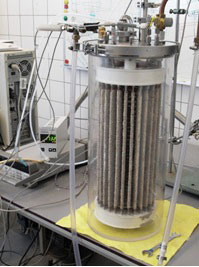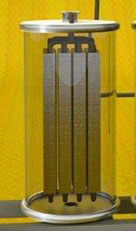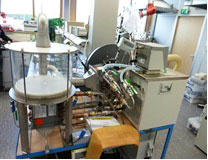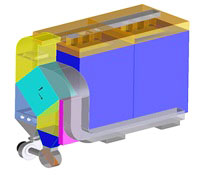Thermochemical Storage
Testing prototype reactors at TNO and at ECN
Achieving thermochemical seasonal thermal storage would be a great asset to the Energy Hub Project: the aim is to achieve compact heat storage with minimal heat losses over long periods.
A particularly promising technology using thermochemical materials (TCMs) is being studied by ECN and TNO. The result foreseen at the end of the project is a TCM module of typically 50 litres of reactor volume, storing 15 kWh of thermal energy.
TNO has built and tested a 20 litre reactor prototype (using water vapour only) based on tubes coated with zeolite 5A. Heat and mass (water vapour) transport were found to be fast and efficient, but output temperatures and thermal capacity will need to be improved.


TCM Lab prototype at TNO and 3D visualisation of the 3 kWh reactor
In the next step, a reactor intended for space heating was designed, shown in the picture above left. It is of fixed bed configuration, comprising of 30 kg of Zeolite 5A with a thermal capacity of 3 kWh and an output power of 800 W. A separate evaporator was designed to improve the performance.
At ECN, the initial material of choice was MgCl2-salt because of its high thermal capacity. A prototype consisting of 20 litres of fixed bed of MgCl2-6H2O was built and tested, illustrated in the picture below left. Moist air was used both as the reacting medium and for heat transfer.


TCM Lab prototype at ECN and 3D visualisation of the 14 kWh reactor
However, detailed thermal analysis revealed a long term cyclic stability issue for this salt. A paper will be written on this subject.
Zeolite thermal storage
For the construction of the next reactor, Zeolite has been selected as a temporary replacement for the MgCl2-salt. The reactor is of a modular design comprising of 150 kg of Zeolite 13X with a thermal capacity of 14 kWh and an output power of 500 W. The system and the reactor are currently being designed and detailed.
Energy storage studies within the E-Hub project
See more details on thermochemical storage technology at TNO.
See more details on thermochemical storage technology at ECN.
Distributed heat storage is being studied by VITO.
Thermoactive foundations are being studied by HSW.
